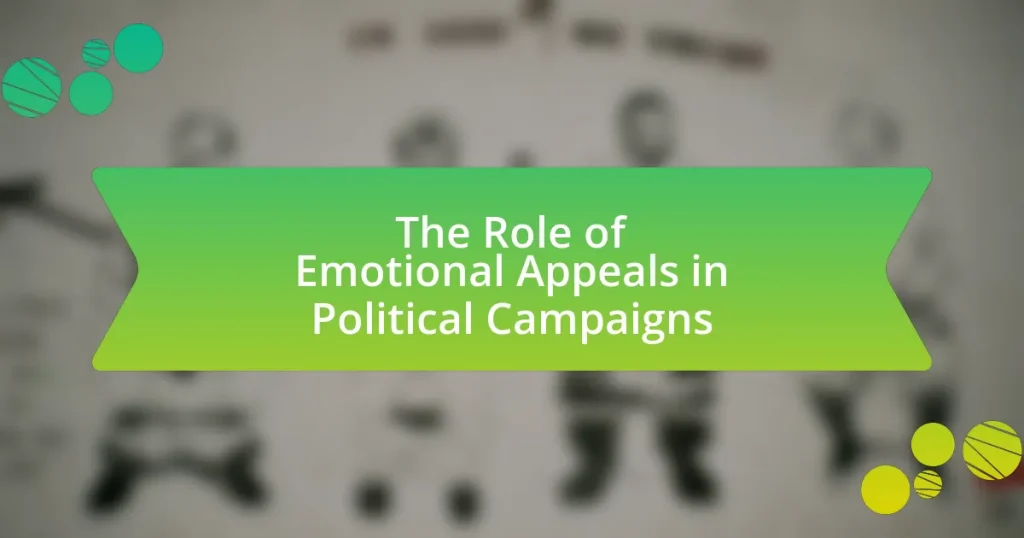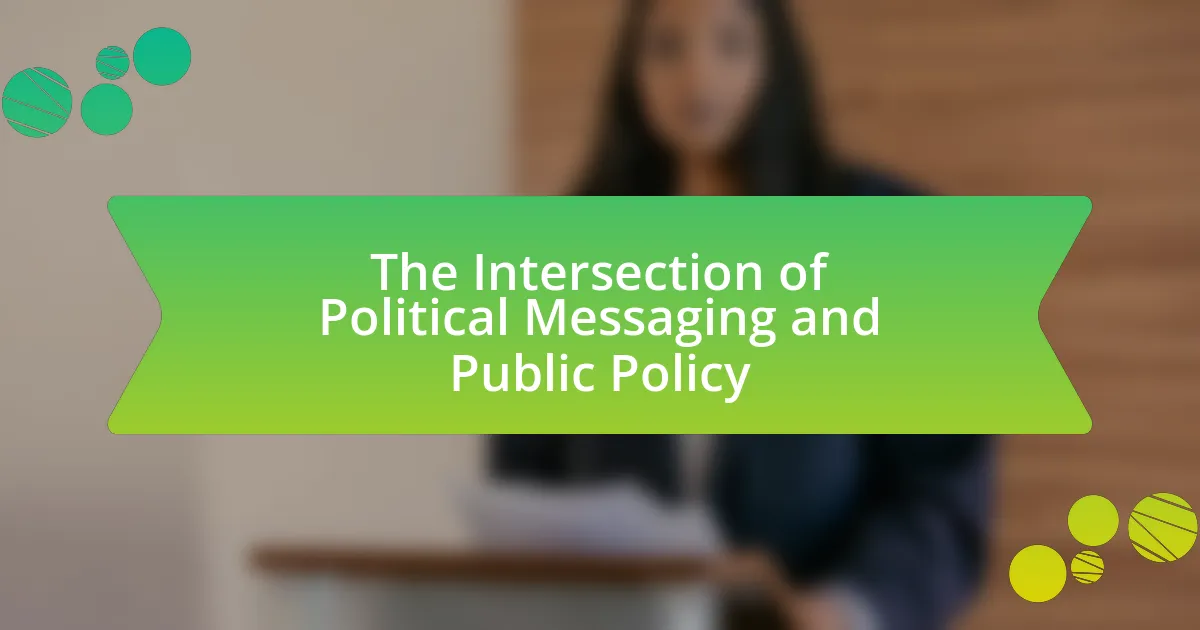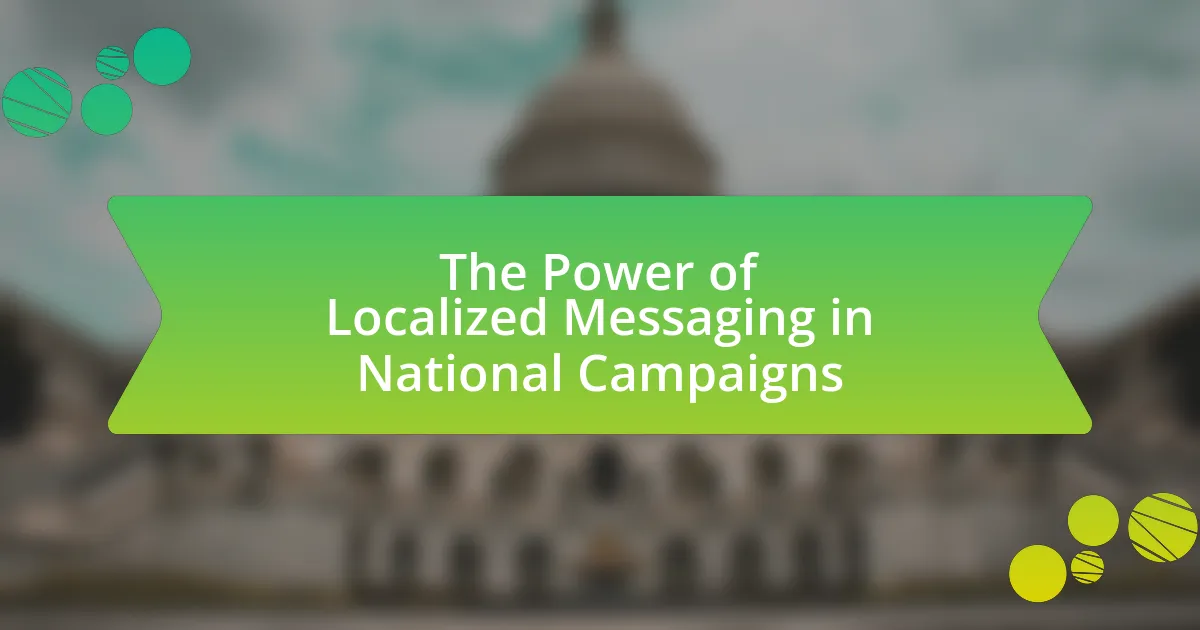Emotional appeals in political campaigns are strategies designed to evoke strong feelings such as fear, hope, anger, or empathy to persuade voters. These appeals significantly influence voter behavior by shaping perceptions and motivating decisions, often proving more effective than rational arguments. The article explores the psychological mechanisms behind emotional appeals, their impact on voter turnout, and the importance of relatability in candidate messaging. It also examines the types of emotional appeals commonly used, the risks associated with fear-based tactics, and best practices for integrating emotional strategies into campaign efforts. Additionally, the article discusses how emotional appeals vary across different political contexts and cultures, highlighting their implications in polarized environments.
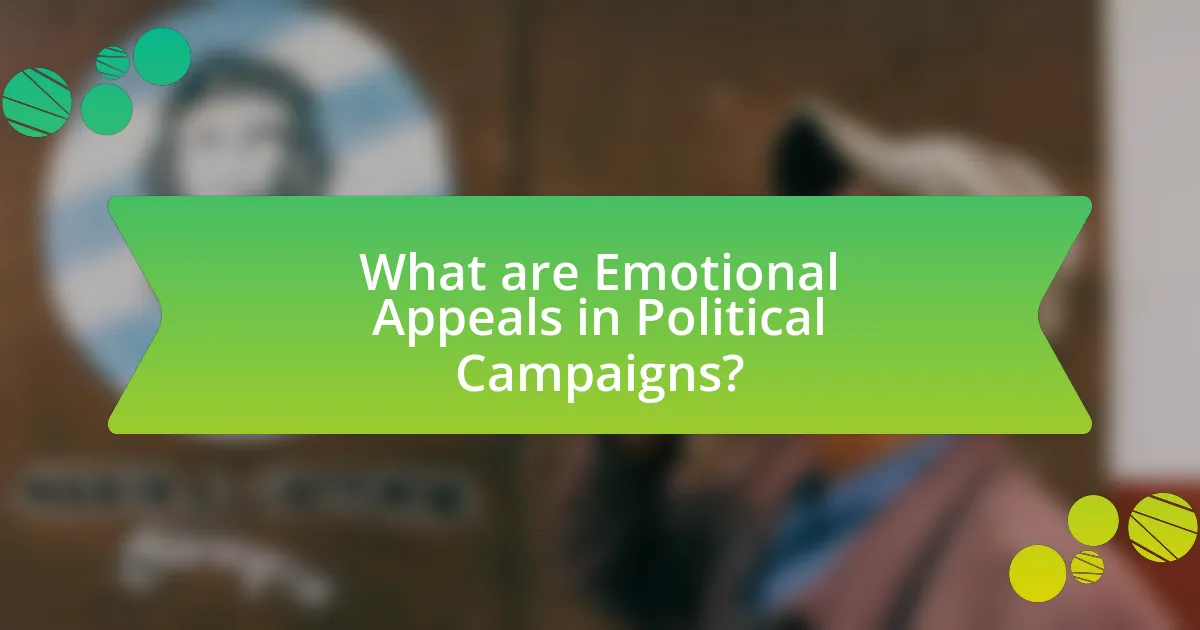
What are Emotional Appeals in Political Campaigns?
Emotional appeals in political campaigns are strategies that evoke strong feelings to persuade voters. These appeals often target emotions such as fear, hope, anger, or empathy to create a connection between the candidate and the electorate. For instance, a campaign might use imagery or narratives that highlight personal stories of struggle to elicit sympathy and support. Research indicates that emotional messaging can significantly influence voter behavior; a study published in the journal “Political Psychology” found that emotionally charged advertisements are more effective in shaping public opinion than purely factual ones.
How do emotional appeals influence voter behavior?
Emotional appeals significantly influence voter behavior by shaping perceptions and motivating decisions. Research indicates that voters are more likely to support candidates who evoke strong emotional responses, such as fear, hope, or anger. For instance, a study by Brader (2006) in “Campaigning for Hearts and Minds: How Emotional Appeals in Political Ads Work” found that emotionally charged advertisements can increase voter turnout by creating a sense of urgency or connection to the issues presented. This demonstrates that emotional engagement can effectively sway voter preferences and enhance electoral participation.
What psychological mechanisms are involved in emotional appeals?
Emotional appeals engage several psychological mechanisms, primarily including affective reasoning, social identity theory, and the principle of reciprocity. Affective reasoning refers to the way emotions influence decision-making, often leading individuals to prioritize feelings over logical analysis. Social identity theory posits that individuals derive part of their self-concept from their group memberships, making emotional appeals that resonate with group identity particularly effective. The principle of reciprocity suggests that when an emotional appeal evokes a strong response, individuals feel compelled to reciprocate, often by supporting the source of the appeal. These mechanisms are supported by research indicating that emotionally charged messages can significantly enhance persuasion and influence voter behavior in political contexts.
How do emotional appeals differ from rational arguments in campaigns?
Emotional appeals differ from rational arguments in campaigns primarily by targeting feelings rather than logic. Emotional appeals aim to evoke strong feelings such as fear, hope, or empathy to influence voter behavior, while rational arguments focus on facts, statistics, and logical reasoning to persuade voters. For instance, a campaign might use a personal story to create a connection with voters, contrasting with another campaign that presents data on economic performance to make its case. Research indicates that emotional messaging can be more effective in mobilizing voters, as seen in the 2008 Obama campaign, which utilized emotional narratives to engage supporters, leading to increased voter turnout.
Why are emotional appeals important in political messaging?
Emotional appeals are important in political messaging because they effectively engage voters’ feelings, leading to stronger connections with candidates and their platforms. Research indicates that emotions significantly influence decision-making; for instance, a study published in the journal “Political Psychology” found that emotionally charged messages can increase voter turnout by creating a sense of urgency and personal relevance. By tapping into emotions such as fear, hope, or anger, political messages can motivate individuals to act, thereby enhancing the overall impact of a campaign.
What role do emotions play in decision-making during elections?
Emotions significantly influence decision-making during elections by shaping voters’ perceptions and preferences. Emotional responses, such as fear, hope, and anger, can drive individuals to support specific candidates or policies, often overriding rational analysis. Research indicates that emotionally charged messages are more likely to be remembered and can create strong attachments to candidates, as seen in the 2008 U.S. presidential election where Barack Obama’s campaign effectively utilized hope and change as emotional appeals. Additionally, studies show that voters often rely on emotional cues when processing political information, leading to decisions that may not align with their logical interests.
How can emotional appeals enhance candidate relatability?
Emotional appeals enhance candidate relatability by fostering a connection between the candidate and the electorate through shared feelings and experiences. When candidates express emotions such as empathy, compassion, or resilience, they resonate with voters on a personal level, making them appear more human and approachable. Research indicates that voters are more likely to support candidates who evoke positive emotions, as these feelings can lead to increased trust and identification with the candidate. For instance, a study published in the Journal of Politics found that candidates who effectively used emotional storytelling in their campaigns saw a significant increase in voter engagement and support, demonstrating the power of emotional appeals in creating relatability.
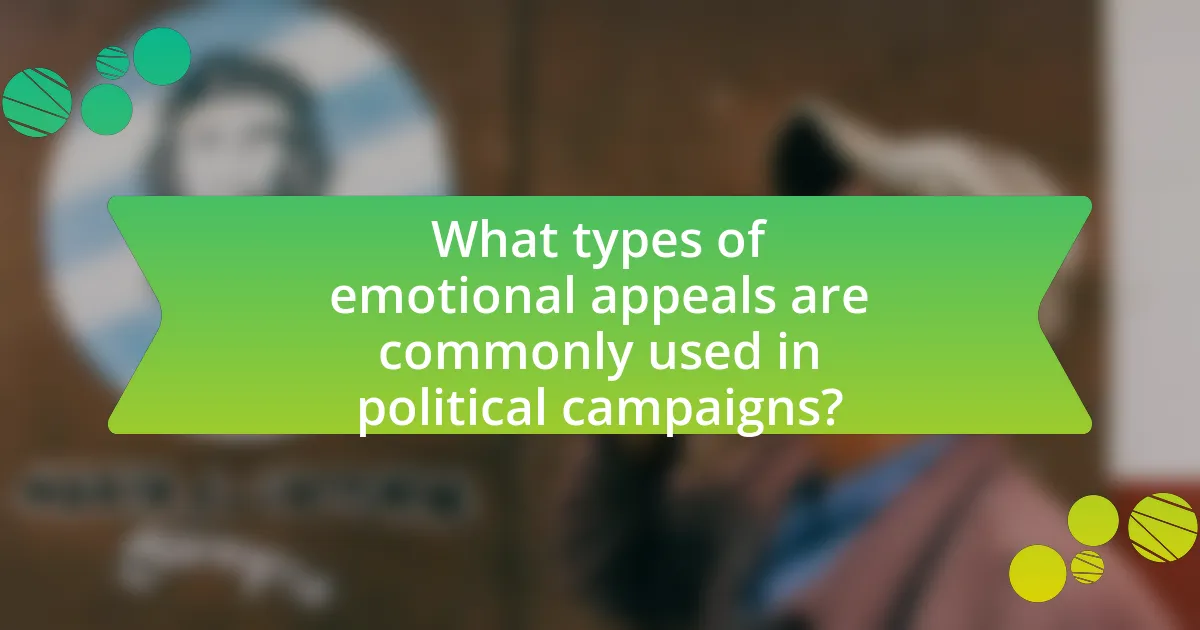
What types of emotional appeals are commonly used in political campaigns?
Political campaigns commonly utilize emotional appeals such as fear, hope, anger, and empathy to influence voter behavior. Fear appeals often highlight potential threats or negative consequences of opposing candidates’ policies, aiming to provoke anxiety and motivate action. Hope appeals focus on positive visions for the future, encouraging voters to aspire for change and improvement. Anger appeals tap into feelings of frustration or injustice, galvanizing supporters to take a stand against perceived wrongs. Empathy appeals seek to create a connection between candidates and voters by highlighting shared experiences or struggles, fostering a sense of community and understanding. These emotional strategies are effective in shaping public perception and driving voter engagement, as evidenced by numerous studies in political psychology that demonstrate the impact of emotions on decision-making processes.
How do fear-based appeals affect voter turnout?
Fear-based appeals significantly increase voter turnout by motivating individuals to act out of concern for potential negative outcomes. Research indicates that when voters perceive a threat, such as economic instability or social unrest, they are more likely to engage in the electoral process to mitigate those fears. For example, a study published in the journal “Political Psychology” found that fear-inducing messages can lead to a 10-15% increase in voter participation, as individuals feel compelled to vote to protect their interests and values. This demonstrates that fear can be a powerful catalyst for mobilizing voters, ultimately influencing election outcomes.
What are the potential risks of using fear in campaigns?
Using fear in campaigns can lead to several potential risks, including desensitization, backlash, and ethical concerns. Desensitization occurs when audiences become numb to fear-based messages, reducing their effectiveness over time. Research indicates that repeated exposure to fear appeals can diminish emotional responses, making future campaigns less impactful. Backlash can arise when audiences perceive fear tactics as manipulative, leading to negative perceptions of the campaign or candidate. A study published in the Journal of Communication found that fear appeals can provoke resistance if the audience feels threatened or coerced. Ethical concerns also emerge, as fear-based strategies may exploit vulnerabilities, raising questions about the morality of such tactics in political discourse.
How can fear-based appeals be effectively balanced with hope?
Fear-based appeals can be effectively balanced with hope by integrating positive messaging that emphasizes solutions and resilience alongside the fear-inducing elements. Research indicates that campaigns that present a clear path to overcoming fear, such as specific actions or policies that can mitigate threats, enhance the overall effectiveness of the message. For instance, a study published in the Journal of Communication found that messages combining fear with a hopeful resolution led to higher engagement and motivation among audiences compared to fear-only messages. This approach not only addresses the emotional response elicited by fear but also empowers individuals with a sense of agency and optimism, fostering a more constructive dialogue in political campaigns.
What role does empathy play in political messaging?
Empathy plays a crucial role in political messaging by fostering a connection between politicians and their constituents. When political messages evoke empathy, they can resonate more deeply with the audience, leading to increased engagement and support. Research indicates that empathetic messaging can enhance voter turnout; for instance, a study published in the Journal of Politics found that emotionally charged messages that appeal to empathy can significantly influence voter behavior and decision-making. By addressing the feelings and experiences of individuals, political campaigns can create a sense of shared understanding and community, ultimately strengthening their appeal and effectiveness.
How can candidates effectively evoke empathy in their campaigns?
Candidates can effectively evoke empathy in their campaigns by sharing personal stories that resonate with voters’ experiences. This approach allows candidates to connect on an emotional level, making their messages more relatable and impactful. Research indicates that narratives can significantly influence voter perceptions; for instance, a study published in the Journal of Politics found that emotionally charged stories can enhance voter engagement and support. By utilizing testimonials, highlighting shared struggles, and demonstrating vulnerability, candidates can foster a sense of community and understanding, ultimately driving voter empathy and support.
What are examples of successful empathetic appeals in recent elections?
Successful empathetic appeals in recent elections include Joe Biden’s 2020 presidential campaign, where he frequently shared personal stories about loss and resilience, connecting with voters on a human level. This approach resonated particularly during the COVID-19 pandemic, as Biden emphasized empathy and unity, which helped him secure over 81 million votes, the highest in U.S. history. Another example is Jacinda Ardern’s leadership in New Zealand, where her compassionate response to the Christchurch mosque shootings in 2019 showcased her empathy, leading to a landslide victory in the subsequent election with 50% of the vote. These instances illustrate how empathetic appeals can effectively engage voters and influence electoral outcomes.
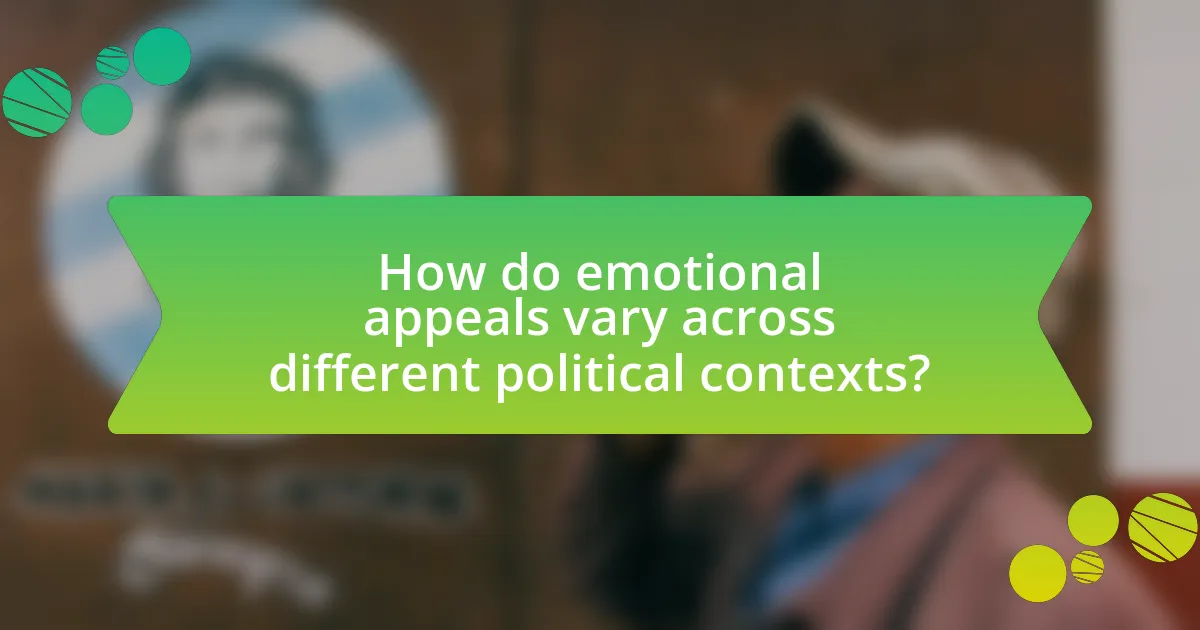
How do emotional appeals vary across different political contexts?
Emotional appeals vary significantly across different political contexts, as they are tailored to resonate with specific audiences and issues. In democratic contexts, emotional appeals often focus on hope, change, and collective identity to mobilize voters, as seen in Barack Obama’s 2008 campaign, which utilized themes of hope and unity to inspire a diverse electorate. Conversely, in authoritarian regimes, emotional appeals may leverage fear and nationalism to consolidate power, exemplified by leaders like Vladimir Putin, who often invoke national pride and external threats to rally support. Research indicates that the effectiveness of these emotional appeals is contingent upon the cultural and social dynamics of the audience, with studies showing that fear-based messaging can be more persuasive in contexts where insecurity is prevalent, while hope-based messaging thrives in stable environments.
What factors influence the effectiveness of emotional appeals in various cultures?
The effectiveness of emotional appeals in various cultures is influenced by cultural values, social norms, and communication styles. Cultural values dictate what emotions are prioritized; for instance, collectivist cultures may respond more positively to appeals that emphasize community and harmony, while individualistic cultures may resonate with messages highlighting personal achievement and autonomy. Social norms shape the acceptability of expressing emotions; cultures that encourage emotional expression may find emotional appeals more effective than those that value stoicism. Additionally, communication styles, such as direct versus indirect approaches, affect how emotional messages are received; cultures favoring directness may prefer straightforward emotional appeals, while those valuing subtlety may respond better to nuanced emotional expressions. These factors collectively determine how emotional appeals are perceived and their subsequent impact on political campaigns across different cultural contexts.
How do cultural values shape emotional messaging in campaigns?
Cultural values significantly shape emotional messaging in campaigns by influencing how messages resonate with target audiences. Campaigns that align their emotional appeals with the cultural values of their audience are more likely to evoke strong emotional responses, leading to increased engagement and support. For instance, a study by Hofstede (2001) on cultural dimensions highlights that collectivist cultures prioritize community and family, prompting campaigns in these regions to emphasize themes of unity and social responsibility. Conversely, individualistic cultures may respond better to messages that highlight personal achievement and freedom. This alignment between cultural values and emotional messaging enhances the effectiveness of campaigns, as evidenced by the success of political advertisements that resonate with the specific cultural context of their audience.
What are the implications of emotional appeals in polarized political environments?
Emotional appeals in polarized political environments significantly influence voter behavior and decision-making. These appeals can deepen divisions by reinforcing existing biases, as individuals are more likely to respond to emotionally charged messages that align with their pre-existing beliefs. Research indicates that emotionally resonant content can enhance engagement and mobilization among supporters, leading to increased voter turnout. For instance, a study published in the Journal of Politics found that emotionally appealing campaign messages can sway undecided voters by eliciting strong feelings that overshadow rational evaluations of policy issues. Thus, while emotional appeals can energize a political base, they also risk entrenching polarization by fostering an “us versus them” mentality among opposing groups.
How do emotional appeals impact campaign strategies?
Emotional appeals significantly influence campaign strategies by enhancing voter engagement and shaping perceptions. Campaigns that effectively utilize emotional narratives can create stronger connections with the electorate, leading to increased support and mobilization. For instance, research by the Pew Research Center indicates that emotionally charged messages can lead to higher levels of voter turnout, as individuals are more likely to act when they feel a personal connection to the issues presented. Additionally, campaigns that evoke emotions such as fear, hope, or empathy can drive specific behaviors, such as donations or volunteerism, thereby amplifying the campaign’s reach and effectiveness.
What are the best practices for integrating emotional appeals into campaign strategies?
The best practices for integrating emotional appeals into campaign strategies include understanding the target audience’s values, crafting relatable narratives, and utilizing storytelling techniques. Campaigns should conduct thorough audience research to identify emotional triggers that resonate with constituents, ensuring that messages align with their beliefs and experiences. For instance, a study by the Pew Research Center found that emotionally charged messages can significantly influence voter behavior, highlighting the importance of emotional resonance in campaign communications. Additionally, employing authentic stories that evoke empathy can create a stronger connection between candidates and voters, as evidenced by successful campaigns that have effectively used personal anecdotes to illustrate policy impacts.
How can campaigns measure the effectiveness of their emotional appeals?
Campaigns can measure the effectiveness of their emotional appeals through various methods, including surveys, focus groups, and data analytics. Surveys can quantify voter sentiment and emotional response to specific messages, while focus groups provide qualitative insights into how emotions influence perceptions of candidates. Data analytics, such as social media engagement metrics and sentiment analysis, can track audience reactions and interactions with emotional content. For instance, a study by the Pew Research Center found that emotional content significantly impacts voter engagement, indicating that campaigns can assess effectiveness by analyzing engagement rates and sentiment shifts before and after emotional appeals are made.
What are practical tips for utilizing emotional appeals in political campaigns?
Practical tips for utilizing emotional appeals in political campaigns include crafting relatable narratives, using evocative imagery, and engaging with personal stories. Relatable narratives help voters connect with candidates on a personal level, as seen in Barack Obama’s 2008 campaign, which effectively used personal anecdotes to resonate with diverse audiences. Evocative imagery, such as powerful visuals in advertisements, can elicit strong emotional responses; for example, the use of children in political ads often triggers protective instincts among voters. Engaging with personal stories allows candidates to humanize their platforms, as demonstrated by Elizabeth Warren’s focus on her family’s struggles, which created empathy and connection with voters. These strategies leverage emotional engagement to enhance voter support and mobilization.
